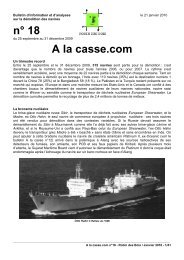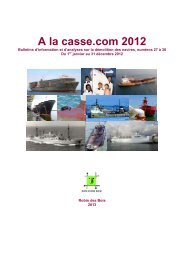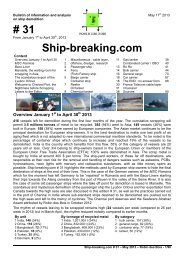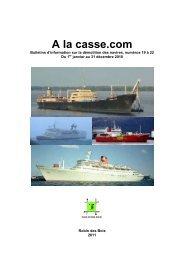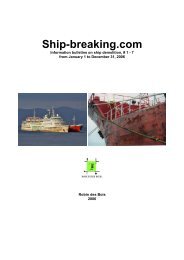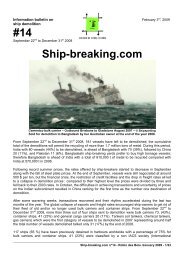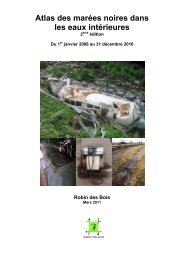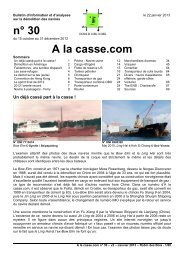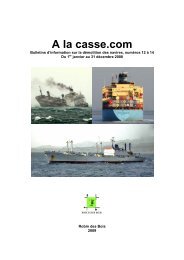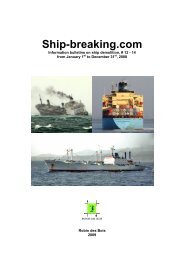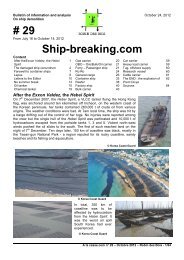Ship-breaking.com - Robin des Bois
Ship-breaking.com - Robin des Bois
Ship-breaking.com - Robin des Bois
You also want an ePaper? Increase the reach of your titles
YUMPU automatically turns print PDFs into web optimized ePapers that Google loves.
India and Turkey in the spotlight<br />
Between July 2 and October 15, 2010, 231 ships left for demolition. The suspension of imports in<br />
Bangla<strong>des</strong>h, monsoon and Ramadan have significantly slowed the pace <strong>com</strong>pared to the previous<br />
trimester with 16 ships per week, but the flow remains strong. India with 107 ships (46%) consolidates its<br />
position as number 1 of the ship-demolition. In tonnage, the reign is even more significant: 825,000 tons<br />
of metals (54% of the total volume) will be recycled in Indian yards. Vessels containing high value metals<br />
remain India’s preserve but all types of ships are wel<strong>com</strong>e, from ferry to container ship, reefer to Ro-Ro,<br />
and more and more large tankers traditionally sent to Pakistan and Bangla<strong>des</strong>h. The Gateway and the<br />
OPA, which had been announced as sold for demolition in Pakistan in the previous bulletin <strong>Ship</strong><strong>breaking</strong>.<strong>com</strong><br />
# 20 have finally been beached in Alang in early October. At the second place with 46<br />
vessels (20%), Turkey confirms its return and positioning on the market of small vessels: 60% of ships<br />
demolished in Turkish yards measure less than 100 m. The largest one is the former replenishment<br />
tanker of the Royal Navy Oakleaf, 173 m in length: she was towed to Aliaga while in 2009 another tanker<br />
of the Royal Navy, the Brambleleaf had been dismantled in Ghent (Belgium). China ranks third with 26<br />
vessels (11%), followed by Pakistan, 18 (8%).<br />
In terms of tonnage of scrap to recycle, India is ahead of China, Pakistan and then Turkey. The<br />
cumulated demolition will allow the recycling of over 1.5 million tons of metals. Tankers – oil tankers,<br />
chemical tankers and gas carriers – are still the first category of ships sold to breakers with 77 units<br />
(33%). In volume, tankers represent over 640,000 tons (42%) of the recycled metal. General cargo<br />
ships, 54 (23%), follow, ahead of bulk carriers, 23 (10%). Container ships, 14 (6%), and car carriers, 8<br />
(3%) seem to be back to work and be<strong>com</strong>e more rare in ship-<strong>breaking</strong> yards. Thus, the car carrier<br />
Saracen Star, which was announced as sent to demolition in the previous bulletin, goes on sailing (see<br />
letters to the editor, Alan Calvert) while the Ducky Sovereign, expected in Bangla<strong>des</strong>h, has not yet be<br />
seen there.<br />
The prices proposed by the demolition yards remain steady, particularly in India and Pakistan. Their<br />
appetite for metals with a high added value has led the Indian yards to offer up to $ 985 per ton for the<br />
two Italian chemical tankers Bice A and Lady Marialaura.<br />
Among the 231 ships sent to demolition, 87 (38%) were operating under European flag or had shipowners<br />
of the European Union or the European Free Trade Association (EFTA). 98 (42%) were built in<br />
these same countries, including 11 in France in Dunkirk, La Ciotat, La Seyne-sur-Mer, La Rochelle,<br />
Nantes and Saint-Nazaire.<br />
After detention, the scrapping<br />
86 (38%) of the 231 vessels were controlled by a classification society which does not belong to the<br />
IACS (International Association of Classification Societies) or had no classification. The substandard<br />
ships are still the first to leave: at least 97 (42%) were previously detained in ports worldwide with a rate<br />
of nearly 80% for bulk carriers and 70% for reefers and general cargo ships. Good news for the<br />
Mediterranean Sea: Turkey has bought a large number of these substandard ships carrying all kinds of<br />
cargo; at least 60% of the ships demolished in Turkey were detained in the recent years.<br />
Years and Meters<br />
The average age of these end-of life ships leaving the waters from 2 July to 15 October 2010 ranged<br />
between 15 years for the tanker Star 8 and 68 years for the US submarine rescue ship Florikan. The<br />
average age was 31 years old; it was 27 years for the double hull tankers and container ships, 30 years<br />
for bulk carriers and single hull tankers, 35 years for general cargo, 39 years for ferries and passengers<br />
ships and 41 years for fishing vessels, converted or not, and factory ships. 111 vessels were less than<br />
150 m in length, 77 measured between 150 and 199 m and 43 between 200 and 315.<br />
<strong>Ship</strong>-<strong>breaking</strong>.<strong>com</strong> # 21 - <strong>Robin</strong> <strong>des</strong> <strong>Bois</strong> / November 2010 - 4/43



